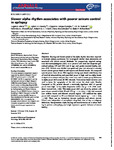Slower alpha rhythm associates with poorer seizure control in epilepsy

Date
2018-12-18Author
Subject
Metadata
Show full item recordAbstract
<jats:title>Abstract</jats:title><jats:sec><jats:title>Objective</jats:title><jats:p>Slowing and frontal spread of the alpha rhythm have been reported in multiple epilepsy syndromes. We investigated whether these phenomena are associated with seizure control.</jats:p></jats:sec><jats:sec><jats:title>Methods</jats:title><jats:p>We prospectively acquired resting‐state electroencephalogram (<jats:styled-content style="fixed-case">EEG</jats:styled-content>) in 63 patients with focal and idiopathic generalized epilepsy (<jats:styled-content style="fixed-case">FE</jats:styled-content> and <jats:styled-content style="fixed-case">IGE</jats:styled-content>) and 39 age‐ and gender‐matched healthy subjects (HS). Patients were divided into good and poor (≥4 seizures/12 months) seizure control groups based on self‐reports and clinical records. We computed spectral power from 20‐sec <jats:styled-content style="fixed-case">EEG</jats:styled-content> segments during eyes‐closed wakefulness, free of interictal abnormalities, and quantified power in high‐ and low‐alpha bands. Analysis of covariance and post hoc <jats:italic>t</jats:italic>‐tests were used to assess group differences in alpha‐power shift across all <jats:styled-content style="fixed-case">EEG</jats:styled-content> channels. Permutation‐based statistics were used to assess the topography of this shift across the whole scalp.</jats:p></jats:sec><jats:sec><jats:title>Results</jats:title><jats:p>Compared to HS, patients showed a statistically significant shift of spectral power from high‐ to low‐alpha frequencies (effect size <jats:italic>g</jats:italic> = 0.78 [95% confidence interval 0.43, 1.20]). This alpha‐power shift was driven by patients with poor seizure control in both <jats:styled-content style="fixed-case">FE</jats:styled-content> and <jats:styled-content style="fixed-case">IGE</jats:styled-content> (<jats:italic>g</jats:italic> = 1.14, [0.65, 1.74]), and occurred over midline frontal and bilateral occipital regions. <jats:styled-content style="fixed-case">IGE</jats:styled-content> exhibited less alpha power shift compared to <jats:styled-content style="fixed-case">FE</jats:styled-content> over bilateral frontal regions (<jats:italic>g</jats:italic> = −1.16 [−0.68, −1.74]). There was no interaction between syndrome and seizure control. Effects were independent of antiepileptic drug load, time of day, or subgroup definitions.</jats:p></jats:sec><jats:sec><jats:title>Interpretation</jats:title><jats:p>Alpha slowing and anteriorization are a robust finding in patients with epilepsy and might represent a generic indicator of seizure liability.</jats:p></jats:sec>
Collections
Publisher
Place of Publication
Journal
Volume
Issue
Pagination
Recommended, similar items
The following license files are associated with this item:

